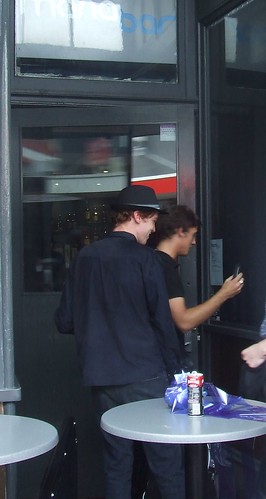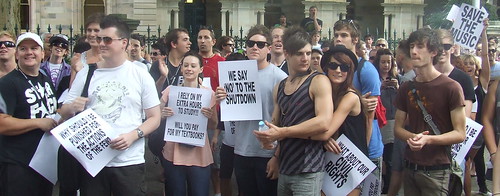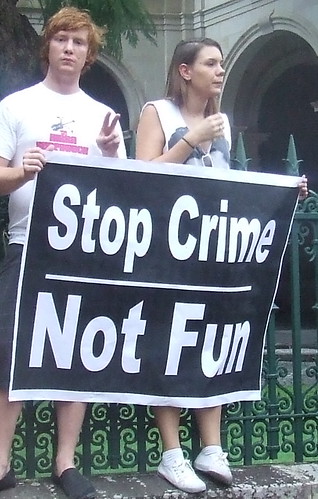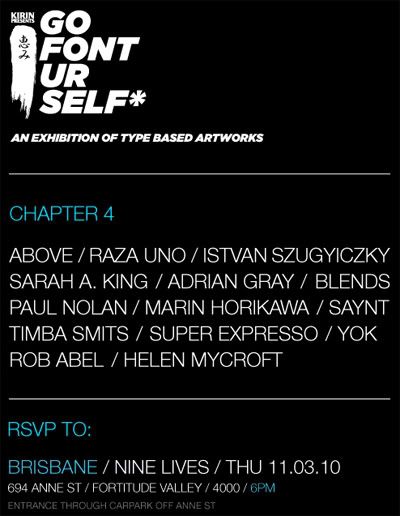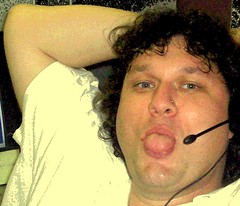Last Wednesday, March 10 2010, I went to
a debate at the University of Quensland about whether Australia needs a formal Charter of Rights, between
Andrew Bartlett and
Professor James Allan. Please note that all links in this article were researched by me and have not been approved or checked by either of the debaters.

Left: Andrew Bartlett. Right: Professor James Allan.
Professor Allan started the debate, asking how many people were in favour of free speech. No-one said they weren't. He said that a charter of rights sets out moral abstractions that no-one disagrees with. He then asked how many people are in favour of allowing tobacco companies to advertise outside schools, or campaign finance limits, and said that Canadian judges had
struck down laws banning such advertising, and
imposing campaign finance limits, using the
Canadian Charter of Rights as their justification. [Although in
Harper v Canada (2004) the Canadian High Court affirmed that such (third-party) spending limits were legal under the Charter - BBlog ].
He said that a charter of rights takes issues like these and takes them out of the hands of elected representatives and puts them in the hands of unlected judges. He stated that a law degree does not "fine-tune your morals", and that when judges disagree with each other, they decide by vote, not by what is "right".
Professor Allan said people disagree about things like hate speech, or whether it is fair to stop people who say they've been raped being cross-examined in certain ways in court. He said that allowing elected representatives to decide these things is more equal than politicising the judiciary by making them decide.
He said that Father Frank Brennan, and all the other members of a panel appointed by the Australian Government to enquire into the idea of a Charter of Rights, were already in favour of such a charter.
He also said that people in Australia who want a Charter of Rights propose a simple law, not an alteration to the Constitution, but that even a simple law is the same as a Constitutional Bill of Rights because it allows judges to interpret the law in an "Alice in Wonderland" way.
The normal approach to interpreting the law is to assume that laws mean what they say, but with a Charter of Rights at hand, judges can interpret laws in new ways. Professor Allan said this happened in a case in Victoria last September [I assume he is referring to "
An application under the Major Crime (Investigative Powers) Act 2004 [2009] VSC 381 (7 September 2009)", where Warren CJ ruled that, since the Victorian Charter of Rights says that someone may not be compelled to incriminate themselves, when someone forced to give evidence into organised crime under Victorian law, it can't be used against the person who is forced to give evidence. I will check this assumption with Professor Allan].
Professor Allan finished his opening statement by saying that democracy is not the same as imposing one's moral values on another.
Andrew Bartlett began by saying that Professor Allan's opening statement used a lot of political rhetoric and
straw-man arguments. He said that courts have often made decisions that politicians don't like. He also said that Australian judges are not and should not be elected, and that judges are accountable through the appeal process.
Bartlett said that the Charter of Rights would be a simple law like any other, and that we already have a system where judges interpret laws, and Parliament can change those laws. The Victorian Parliament, for example, has changed laws after they weren't happy with a judge's decision.
Bartlett said that a Charter of Rights is about expanding protections in law against administrative decisions. A Charter would give direction to judges making decisions about those actions, especially when gross injustices occur from those actions.
Bartlett rejected the idea that a Charter would undermine democracy or expand the rights of judges, and said it would rather strengthen the Parliament against the Government.
Then, each debater was able to ask questions of the other.
Professor Allan asked Andrew Bartlett if individual citizens have more ability to speak their mind in Australia, or in the UK or Canada. He also asked why that right to speech is better protected by judges?
Bartlett replied that it is NOT better protected by judges, but by Parliament. Judges are not in fact better, they just apply the law that Parliament decides. He also replied that part of the problem with free speech in the UK is defamation laws which are easy to sue people under, which has nothing to do with the UK's charter of rights.
Professor Allan then asked Andrew Bartlett about an example from the UK. The UK Parliament passed a law saying that the defence in court is restricted in the ways it can cross-examine someone who says she has been raped. The UK courts said that the right to a fair trial over-rode the right of a rape complainant to not be cross-examined harshly. Who should decide in a case like this?
Bartlett replied that Parliament should decide. If Parliaments don't like judges' decisions, they should change the law. Professor Allan followed up by asking why the UK has never done that. Bartlett replied that that is up to the Parliament, and anyone who thinks that Australian parliaments are too weak to change such decisions should look at history, where they will see that they have often done that.
Andrew Bartlett asked Professor Allan that, if he thinks it's not a good idea to elect judges, why is it a problem that unelected judges should make decisions on what a charter of rights means?
Professor Allan responded saying that judges can strike down laws and re-write them, not just interpret them. He also said the Canadian Parliament has never over-ruled judges decisions in rights cases, and that it "cannot" do so [he meant politically they can't, not that they don't have the legal power to do so].
Andrew Bartlett then asked Professor Allan what the difference is between judges deciding cases under, say, the Immigration Act and under a Human Rights Act?
Professor Allan said that the difference is that in the first sort of case, the judges decide which set of politicians should be making the decision, while in the second sort of case, the judges are making the decisions for themselves. He said that this leads to re-writing of laws, and terrible lies. He brought up the
Al-Kateb case, in which the High Court of Australia ruled that it was lawful to detain a stateless person indefinitely. He said that this would have been decided differently if there was a Charter of Rights. He said that Canada has decided through judges that every refugee applicant should have an oral hearing, although the money spent on that could well be spent on other things.
Professor Allan says these things need to be decided through the political process, and that it was good in the Al-Kateb case that the judges "didn't lie" about what the law actually is.
Andrew Bartlett said that it's a very hard thing to say that judges are "lying" when you disagree with their decision. He said that when Parliament introduced mandatory detention, that it appeared that indefinite detention was not in fact their aim. Laws are often ambiguous and judges need to interpret them and work out which law should take precedence.
Then questions from the floor were invited.
I asked Professor Allan what he, as a citizen would do if a majority of people agreed with a policy that he thought was immoral. Professor Allan said that as a citizen, you'd have only three options: armed insurrection, civil disobedience, or to run away. But he said the question was not so interesting if you were talking about citizens, and said it was more interesting if you were talking about what judges should do. He said that in some cases a judge SHOULD lie about what the law is, to stop injustice, but only rarely.
Professor Allan was asked why the greater danger with human rights legislation was of judges making bad decisions. He said that he was going on the evidence of common law countries. He also said that politicians were afraid to confront judges talking the language of rights, even if the judges' decisions are absurd.
Andrew Bartlett responded to that by saying tht Parliament *likes* fighting judges and courts.
Professor Allan was asked another question about Parliaments being reluctant to overturn judges' decisions; the questioner asked if that wasn't an indication that the system is working as it should? The questioner also asked about the idea that politicians wouldn't want to pick a fight with tobacco advertisers, and said that didn't seem logical.
Professor Allan said that he didn't know why
section 33 of the Canadian Charter had not been used by politicians to over-ride decisions they disagreed with.
He also said that Australians should have a vote on a Charter of Rights, as 2 referendums on a Bill of Rights have already failed. He said it would be much less objectionable to have a Charter of Rights if it came in after a vote.
Andrew Bartlett replied that we don't normally have votes on ordinary pieces of law, which is what a Charter of Rights would be.
Professor Allan was asked which would be worse, a Charter of Rights, or cases when judges find
implied rights in the Australian Constitution.
Professor Allan said that because the idea of implied rights is so illegitimate, judges are often quite restrained when they find those rights exist. He said that this is likely to change if a Charter of Rights is enacted.
Andrew Bartlett was asked that if a Charter of Rights has the same weight as other legislation, will it lead to vague interpretations of the law?
He replied that the vagueness of the law depends on what you put in it. He also stated that people sometimes overstate the gains that a Charter of Rights might bring, and that if the courts get "too flowery", the Parliament can change the law.
Then the two speakers wrapped up. Professor Allan said that Andrew Bartlett had said that you can get justice by going from the national court system to the international one, which is a bad idea. He also said you cant get "justice" because people disagree with what it is.
Andrew Bartlett repsonded by saying that he did not say going to International courts is a good idea, and that they are often quite clumsy. He said that
in this federal election year, political parties should state where they stand on a Charter of Rights, and reminded the audience that
he is a candidate in the Australian Greens interest for the
seat of Brisbane, and that the
Greens support a Charter of Rights.

